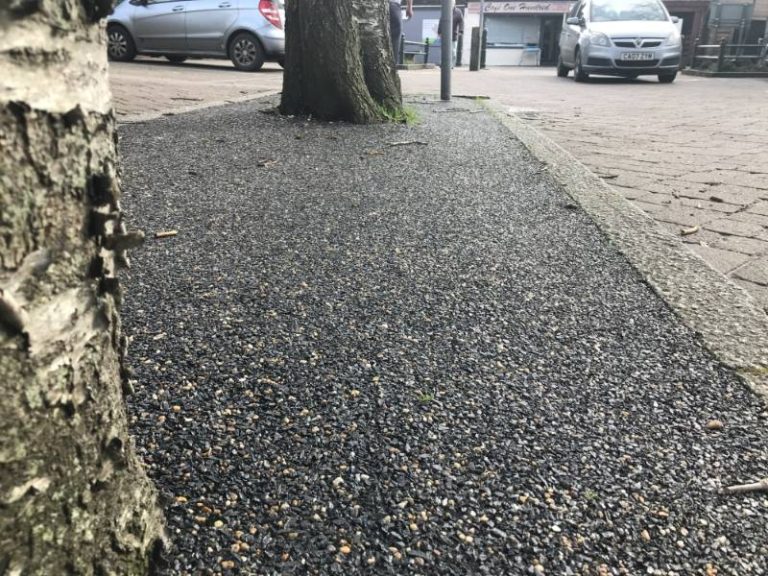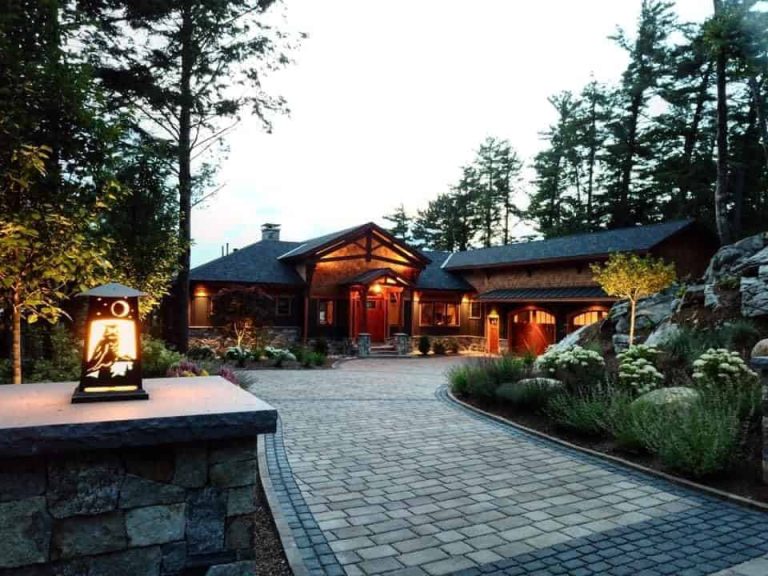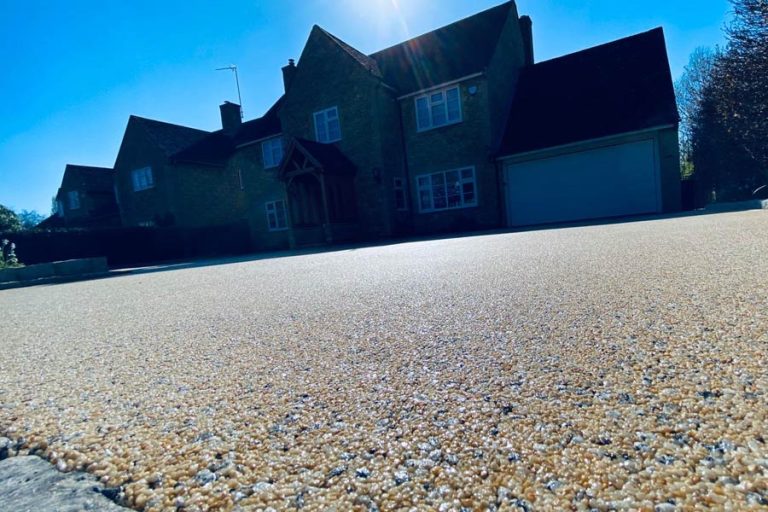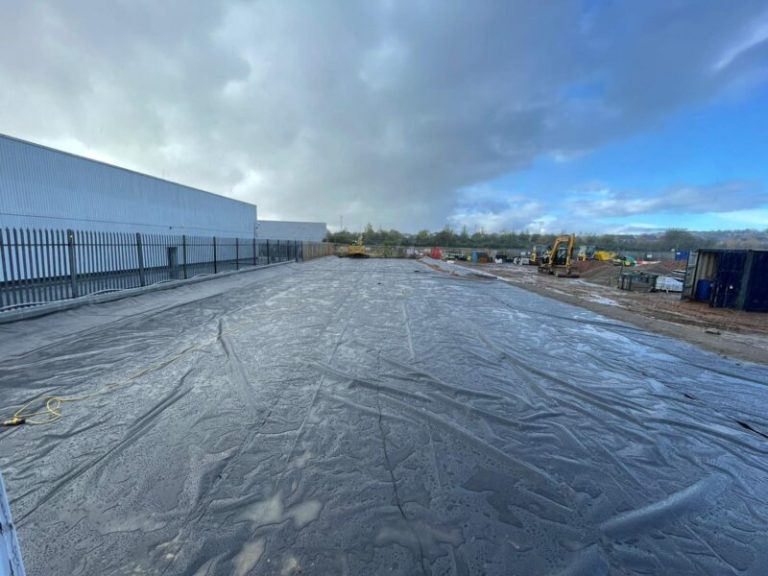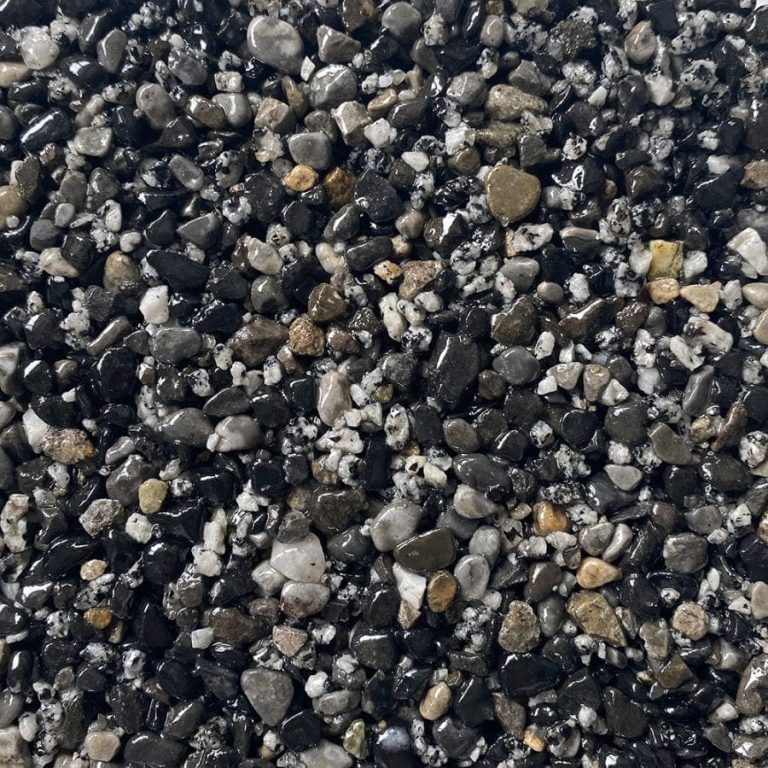Permeable Resin Driveway Cost A Comprehensive Guide
The permeable resin driveway cost is a significant factor to consider when choosing a driveway for your property. This guide dives deep into the factors influencing pricing, from material costs and installation procedures to regional variations and comparisons with alternative driveway types. We’ll explore the advantages and disadvantages of permeable resin driveways, comparing them to traditional asphalt options, while providing detailed insights into installation, maintenance, and potential design considerations.
Understanding the elements that contribute to the overall cost will help you make an informed decision about your driveway project. This comprehensive overview provides a clear picture of the investment involved in a permeable resin driveway, from initial setup to long-term upkeep.
Introduction to Permeable Resin Driveways
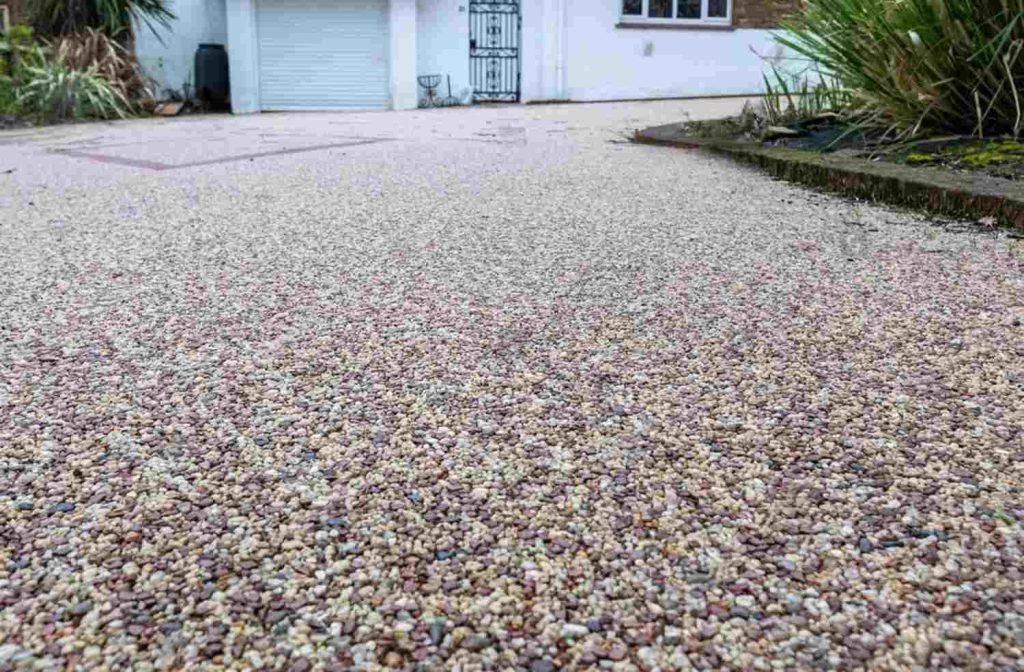
Permeable resin driveways represent a modern approach to paving, combining the aesthetic appeal of traditional driveways with enhanced environmental benefits. These innovative surfaces are designed to allow water to infiltrate the ground, reducing runoff and mitigating the strain on local drainage systems. However, they also present some unique considerations regarding cost and maintenance.
This approach to driveway construction offers a balance between sustainability and aesthetics. Understanding the key materials, available types, and comparative analysis against traditional options is crucial for making informed decisions. The following sections will delve into these aspects, providing a comprehensive overview of permeable resin driveways.
Key Materials Used in Construction
The construction of permeable resin driveways involves a blend of specialized materials. A crucial component is the permeable resin itself, typically composed of recycled materials and polymers. This resin is carefully formulated to ensure durability, resistance to weathering, and permeability. A layer of aggregate, such as crushed stone or gravel, is often incorporated beneath the resin to enhance drainage and provide support. Additionally, specialized geotextile fabrics might be used to separate the aggregate from the underlying soil and further facilitate water infiltration.
Types of Permeable Resin Driveways
Permeable resin driveways come in a variety of colors and textures. The resin itself can be formulated to achieve a range of aesthetic effects, from natural tones mimicking stone to vibrant hues. Further customization is possible through the choice of aggregate materials, enabling a diverse range of visual appeal. Different textures can also be achieved through variations in the resin’s application and the chosen aggregate.
Comparison with Traditional Asphalt Driveways
| Feature | Permeable Resin Driveway | Traditional Asphalt Driveway |
|---|---|---|
| Cost | Generally, higher upfront cost due to specialized materials and installation procedures. | Generally, lower upfront cost. |
| Maintenance | Requires less frequent maintenance, primarily focusing on occasional cleaning and sealing to preserve the resin’s integrity. | Requires more frequent maintenance, including sealing, crack repairs, and resurfacing. |
| Environmental Impact | Reduces stormwater runoff, improving local water quality and mitigating flooding. | Contributes to stormwater runoff, potentially leading to flooding and water pollution. |
| Durability | Highly durable, withstanding heavy use and exposure to various weather conditions. Durability is often supported by the resin’s resilience and the supportive aggregate layer. | Durable but susceptible to damage from prolonged exposure to harsh weather conditions, leading to cracks and potholes. |
| Aesthetics | Offers diverse aesthetic options through color and texture variations. | Limited aesthetic choices typically rely on variations in color and texture of the asphalt itself. |
This table provides a comparative overview, showcasing the advantages and disadvantages of each type of driveway. Factors such as cost, maintenance requirements, and environmental impact must be considered in the decision-making process.
Factors Influencing Cost: Permeable Resin Driveway Cost
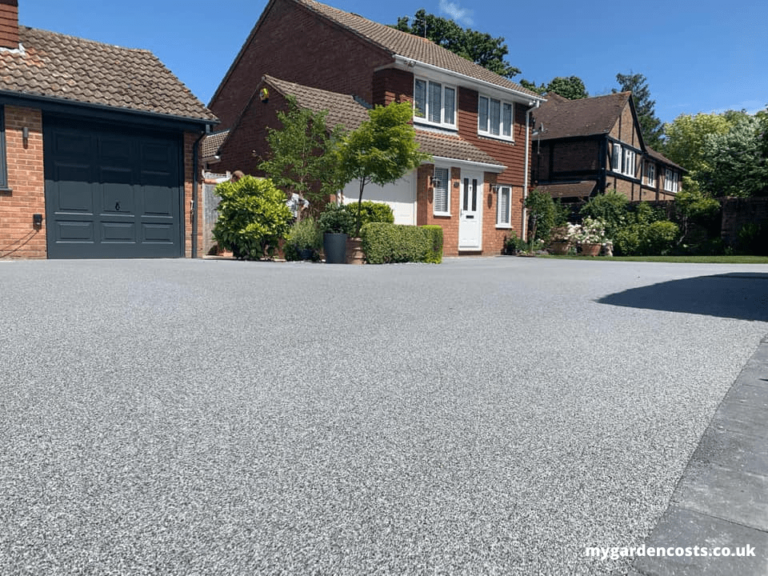
Source: co.uk
Permeable resin driveways, while offering environmental benefits and aesthetic appeal, can vary significantly in price. Understanding the key factors that influence these costs is crucial for homeowners planning such a project. Factors such as labor rates, material choices, and project scale all contribute to the overall expense.
Several factors contribute to the final cost of a permeable resin driveway. These include the labor-intensive nature of the installation process, the diverse range of materials available, and the scale of the project. Careful consideration of these factors will help homeowners make informed decisions and accurately estimate project budgets.
Labor Costs
Labor costs play a substantial role in the overall project price. Installation of a permeable resin driveway is a complex process requiring specialized skills and equipment. Skilled professionals with experience in resin application, aggregate placement, and precise groundwork preparation are essential for a successful and durable installation. Variances in labor rates across different regions and the experience level of the installation team significantly affect the final cost. The amount of time required for each step of the process, from site preparation to the final sealing, is a significant factor influencing the labor cost. This time is often dictated by factors such as the size of the area, the complexity of the design, and the availability of materials.
Project Size and Complexity
The size and complexity of the driveway project directly impact the overall cost. A larger driveway area naturally requires more materials and labor, increasing the project cost. Similarly, intricate designs or customized features will demand additional time and expertise, thus raising the overall price. For example, a driveway with a curved shape or integrated landscaping features would likely involve more complex installation procedures and higher labor costs. Driveways with significant grade changes or challenging site conditions might also involve additional costs for site preparation or specialized equipment.
Material Costs
Material costs, including the resin, aggregates, and other necessary components, significantly influence the final price of the permeable resin driveway. The choice of resin type can vary widely in cost. Premium resins, known for their durability and longevity, tend to command higher prices compared to standard resin options. Aggregates also play a key role. Different aggregate types and their availability in specific regions can impact pricing. Furthermore, factors such as transportation costs and availability of specific aggregate types can affect the overall material cost. The quantity of each material required directly correlates with the total cost.
Material Cost Breakdown
| Resin Type | Aggregate Type | Estimated Cost per sq ft (USD) |
|---|---|---|
| Standard Polyurethane Resin | Crushed Granite | $5-8 |
| High-Performance Epoxy Resin | Recycled Glass Aggregate | $8-12 |
| High-Performance Polyaspartic Resin | Recycled Concrete Aggregate | $9-15 |
Note: Costs are approximate and may vary based on region, supplier, and project specifics.
Installation and Maintenance Costs
Permeable resin driveways, while environmentally friendly, often come with specific installation and maintenance requirements. Understanding these aspects is crucial for homeowners to accurately assess the total cost of ownership. Proper installation is paramount to the longevity and performance of the system. Likewise, consistent maintenance is essential to preserving the aesthetic appeal and functionality of the driveway.
Installation procedures for permeable resin driveways generally involve a meticulous process. The quality of the installation directly impacts the lifespan and effectiveness of the system. Accurate material selection and careful workmanship contribute to a durable and aesthetically pleasing final product.
Installation Procedures
The installation of a permeable resin driveway typically involves several key steps. First, the existing surface is prepared by removing any debris and ensuring a level base. Then, a specialized permeable resin mixture is applied, often in layers, to create the driving surface. Following this, a layer of aggregate is strategically placed on top of the resin. This aggregate acts as a stabilizing element and provides traction. Proper compaction of the aggregate is vital for the structural integrity of the driveway. Variations in aggregate size and type influence the final look and feel of the driveway.
Steps Involved in Laying Resin and Installing Aggregate
- Surface Preparation: The existing surface is meticulously cleaned and leveled to ensure a smooth and stable base for the resin application. This involves removing any loose debris, filling in any cracks, and ensuring proper drainage.
- Resin Application: A specific permeable resin mixture, carefully selected for the project, is applied in layers. Each layer is allowed to cure according to the manufacturer’s instructions, ensuring optimal bonding and strength. Careful attention to layer thickness is essential.
- Aggregate Placement: The selected aggregate, typically graded for permeability and traction, is strategically spread evenly over the cured resin. Careful attention is paid to ensuring the aggregate is properly compacted to provide stability and prevent settling.
- Compaction: The aggregate layer is compacted to achieve the desired density and stability. This process ensures the long-term structural integrity of the driveway and minimizes the risk of future issues.
Labor Time Requirements
The time required for professional installation varies significantly depending on the size and complexity of the driveway. A small driveway may take a few days, whereas a large, complex project could take a week or more. Factors like site preparation, resin application, and aggregate placement influence the overall installation time. Estimating labor time should be based on a professional consultation with experienced contractors.
Cost Comparison: Professional vs. DIY
Professional installation generally costs more than a DIY approach, but the higher price point often reflects the expertise and equipment required for high-quality work. Professional installers possess the necessary skills and equipment to ensure a proper curing process, which is crucial for long-term performance. DIY installations might result in a compromised installation, potentially leading to issues with the driveway’s durability or permeability.
Maintenance Needs Comparison
Permeable resin driveways generally require less ongoing maintenance compared to traditional asphalt or concrete driveways. The permeable nature of the system allows for natural water drainage, minimizing the risk of water damage and the need for frequent repairs. However, routine cleaning and occasional sealing remain necessary to maintain the driveway’s appearance and functionality.
Potential Maintenance Tasks and Costs
| Maintenance Task | Frequency | Estimated Cost (per year) |
|---|---|---|
| Cleaning (using a pressure washer) | Annually or as needed | $50 – $150 |
| Sealing (every 3-5 years) | Every 3-5 years | $200 – $500 |
| Addressing minor cracks or damage | As needed | Variable, depending on the severity |
Note: Costs are estimates and can vary based on location, material type, and the extent of maintenance required.
Project Considerations and Design Options
Permeable resin driveways offer a stylish and functional alternative to traditional asphalt or concrete. However, successful implementation hinges on careful site assessment, thoughtful design choices, and a thorough understanding of the project’s specific needs. This section explores the crucial aspects of planning and designing a permeable resin driveway tailored to various property types.
Careful site planning and assessment are paramount for a successful permeable resin driveway project. This involves a detailed analysis of the existing site conditions, including the soil type, drainage patterns, slope, and any existing infrastructure. Understanding these factors allows for the creation of a design that effectively manages water runoff and integrates seamlessly with the surrounding environment.
Site Assessment and Planning
Proper site assessment is crucial to ensuring the longevity and effectiveness of the permeable resin driveway. The analysis should include a detailed survey of the existing terrain, including slope gradients, drainage patterns, and the presence of any underground utilities. Identifying potential issues early on, such as problematic soil compaction or inadequate drainage, allows for proactive solutions and cost-effective design modifications. Careful consideration of the surrounding landscape is essential to ensure the driveway complements the existing environment and minimizes any negative impact on neighboring properties.
Design Considerations
Several key factors influence the design of a permeable resin driveway. Drainage efficiency is paramount, as the driveway’s ability to manage water runoff directly impacts its performance and longevity. Aesthetics are also important, as the driveway’s design should complement the surrounding architecture and landscape. Consideration of the driveway’s shape, color, and pattern is crucial to achieve the desired visual appeal.
Design Options
A variety of design options are available for permeable resin driveways, allowing for customization and personalization. Patterns, colors, and shapes can be strategically employed to enhance visual appeal and create unique designs. Geometric patterns, such as squares, circles, or triangles, can add a touch of sophistication. Using contrasting colors can draw attention to specific elements of the driveway or create a visually striking effect. The shape of the driveway can be adjusted to suit the property’s layout and enhance functionality, such as incorporating curves to navigate around obstacles.
Examples of Driveway Designs
Residential properties can benefit from designs that integrate seamlessly with the home’s architectural style. For instance, a contemporary home might benefit from a minimalist design with a smooth surface and muted colors. A more traditional home might be enhanced by a design incorporating intricate patterns or textured surfaces. Commercial properties, such as retail stores or office buildings, can benefit from a durable design that emphasizes functionality and longevity. For example, a commercial driveway might incorporate high-traffic areas with a reinforced resin surface and visually appealing patterns to create a strong first impression.
Designing for Specific Requirements
Careful consideration must be given to specific requirements, such as slope and accessibility. The design should incorporate appropriate slopes to ensure proper drainage and prevent water accumulation. Driveways should be designed with accessibility in mind, ensuring compliance with relevant codes and standards, especially for wheelchair users or those with mobility limitations. The incorporation of ramps or specific pathways can greatly improve accessibility.
Driveway Layout Options
| Driveway Layout | Pros | Cons | Estimated Cost (USD) |
|---|---|---|---|
| Straight, Simple Layout | Easy to install, cost-effective | It may appear less visually appealing | $10,000 – $15,000 |
| Curved Layout with Intricate Patterns | Visually appealing, unique design | More complex installation, potentially higher cost | $15,000 – $25,000 |
| Multi-level Driveway with Drainage Systems | Handles complex terrain effectively | Requires specialized design and installation, higher cost | $20,000 – $35,000 |
*Note:* Costs are approximate and may vary based on specific project requirements, material selection, and labor rates.
Geographic Variations in Cost

Permeable resin driveways, while offering environmental benefits and aesthetic appeal, exhibit cost variations across different geographic regions. These fluctuations are often influenced by several factors, including labor rates, material availability, and local regulations. Understanding these variations is crucial for homeowners planning such projects, as it helps in realistic budgeting and informed decision-making.
Regional Variations in Labor Costs
Labor costs for installation play a significant role in the overall price of a permeable resin driveway. Higher labor rates in densely populated urban areas, coupled with increased demand for specialized installation services, tend to drive up the cost compared to more rural regions. Factors such as experience and licensing requirements for installers also contribute to the variation in labor expenses.
Material Availability and Supplier Impact
The availability and pricing of materials directly impact the cost of permeable resin driveways. Regions with readily available suppliers often see lower material costs. Conversely, areas with limited local suppliers might face higher prices due to transportation costs and potential import fees. The presence of specialized resin manufacturers or distributors in a particular area can also influence pricing.
Local Regulations and Permits
Local building codes and regulations regarding permeable paving systems can significantly affect the project’s cost. More stringent regulations or a complex permitting process in certain areas may necessitate additional fees and potentially prolong the project timeline. Specific requirements for drainage systems, inspections, and material certifications can increase the overall expenditure.
Urban vs. Rural Cost Differences
Urban areas often witness higher costs for permeable resin driveways due to the reasons mentioned earlier. Labor rates are usually higher, and material sourcing may be more expensive. Conversely, rural areas may experience lower costs due to potentially lower labor rates and greater material availability from local suppliers. However, these generalizations can vary based on specific market conditions and project requirements.
Impact of Local Material Suppliers
The proximity and pricing policies of local material suppliers are key factors in determining the cost of materials. A strong local network of suppliers can provide competitive pricing and expedite delivery, thereby lowering the overall project cost. Conversely, limited local options can lead to higher material costs due to shipping expenses or the need to source materials from further away.
Average Costs per Square Foot
The following table provides a general comparison of average costs per square foot for permeable resin driveways in various geographic regions. Note that these are estimates, and actual costs may vary based on specific project details and local conditions.
| Geographic Region | Estimated Average Cost per Square Foot |
|---|---|
| Urban Northeast US | $15-25 |
| Urban South Central US | $12-20 |
| Rural Midwest US | $10-18 |
| Coastal California | $18-28 |
| Southern Florida | $15-25 |
Cost Comparison with Alternative Driveways
Permeable resin driveways offer a compelling alternative to traditional paving materials, but understanding their cost implications compared to other options is crucial for informed decision-making. This comparison considers not only the initial investment but also the long-term maintenance and replacement costs.
A crucial factor in choosing a driveway material is the total cost of ownership, encompassing the initial purchase, ongoing upkeep, and potential future replacements. This analysis delves into the comparative financial implications of various driveway types.
Initial Investment Costs
The initial cost of a permeable resin driveway is often higher than that of asphalt or gravel driveways, but lower than a concrete driveway, especially when factoring in the need for specialized installation and materials. While the upfront cost might seem substantial, it’s vital to assess the long-term cost-effectiveness. This difference in initial cost can be influenced by factors such as the size of the driveway, the complexity of the design, and the availability of local materials.
Ongoing Maintenance Costs
Regular maintenance is essential for all driveway types to preserve their structural integrity and aesthetic appeal. The frequency and cost of maintenance vary significantly. Asphalt driveways require periodic sealing and patching to prevent cracking and deterioration, leading to recurring maintenance expenses. Concrete driveways, while durable, may need sealing, crack repair, and potentially replacement if substantial damage occurs. Gravel driveways necessitate regular leveling and maintenance to maintain their appearance and prevent erosion. Permeable resin driveways are relatively low-maintenance, requiring minimal upkeep compared to other options.
Long-Term Repair and Replacement Costs
The frequency and cost of repairs and replacements directly impact the total cost of ownership. Asphalt driveways are prone to cracking, potholes, and rutting, requiring frequent repairs and eventual replacement. Concrete driveways, while more durable, can be susceptible to damage from freeze-thaw cycles, impacting long-term structural integrity. Gravel driveways require more frequent repairs to maintain their stability and aesthetic appeal. Permeable resin driveways are designed for long-term durability and low maintenance, potentially minimizing long-term repair and replacement costs.
Environmental Impact, Permeable resin driveway cost
The environmental impact of different driveway materials is a significant consideration. Asphalt production relies heavily on fossil fuels, contributing to greenhouse gas emissions. Concrete production also consumes considerable energy and resources, impacting environmental sustainability. Gravel driveways have a lower environmental impact than asphalt and concrete, but may contribute to erosion and habitat loss if not managed properly. Permeable resin driveways, through their ability to manage stormwater runoff, offer an environmentally friendly option, contributing to local water quality and reducing strain on drainage systems.
Return on Investment (ROI)
The ROI of a permeable resin driveway can be significant over the long term. While the initial investment might be higher, the reduced maintenance, extended lifespan, and environmental benefits translate into substantial cost savings over the life of the driveway. Reduced water runoff and potential tax incentives related to environmentally friendly choices further enhance the financial appeal. For instance, a homeowner in an area with frequent storms may see a high ROI in a permeable resin driveway due to reduced flooding and associated property damage.
Cost Comparison Table
| Driveway Type | Initial Cost | Maintenance Cost (Annual) | Repair/Replacement Cost (Long-Term) | Environmental Impact |
|---|---|---|---|---|
| Asphalt | Moderate | High | High | High |
| Concrete | High | Moderate | Moderate to High | Moderate |
| Gravel | Low | Moderate | Moderate | Low to Moderate |
| Permeable Resin | High | Low | Low | Low |
Ultimate Conclusion

In conclusion, the permeable resin driveway cost depends on various interacting factors, including materials, labor, design complexity, and geographic location. Careful consideration of these elements, alongside the potential long-term benefits of this environmentally friendly option, can help homeowners make an informed choice. Ultimately, the total cost is not just a financial figure; it represents the value of a functional, attractive, and sustainable driveway investment for your property.
